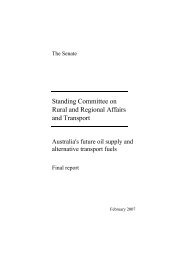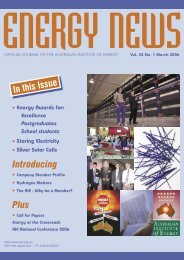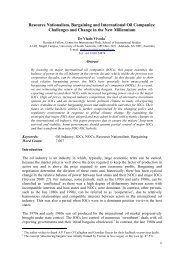Jun 2007 - Australian Institute of Energy
Jun 2007 - Australian Institute of Energy
Jun 2007 - Australian Institute of Energy
Create successful ePaper yourself
Turn your PDF publications into a flip-book with our unique Google optimized e-Paper software.
10 WAYS TO GET THE MOST FROM YOUR LEGAL TEAM<br />
By Mark Kemp*<br />
Very few energy companies whose involvement in major infrastructure<br />
projects requires large scale land or easement acquisitions use their<br />
lawyers to best effect. Typically, such companies call their lawyers<br />
in at the beginning <strong>of</strong> these projects to ensure compliance with<br />
regulatory and planning issues, and then at the tail end to deal with<br />
any unresolved disputes with a small number <strong>of</strong> recalcitrant land<br />
owners. Using your legal team through the acquisition/construction<br />
phase <strong>of</strong> a project can save you money, avoid disputes and ensure<br />
that project timeframes are met. It is here that a good legal team can<br />
really prove its worth and deliver value for money.<br />
1. INVOLVE THE LEGAL TEAM EARLY<br />
Don’t wait until discussions with land owners have already taken<br />
place. Involve your lawyers in those discussions and in any initial<br />
project team briefings so that they are familiar with and understand<br />
all <strong>of</strong> the issues surrounding the project. Involving your lawyers<br />
early is critical if there are likely to be issues which relate to<br />
particular owners or involve geographical features, endangered<br />
fauna and flora, or community sensitivities.<br />
2. INVOLVE THE LEGAL TEAM<br />
IN COMMUNITY BRIEFINGS<br />
It is pretty much standard procedure nowadays for companies to hold<br />
community briefings and presentations in the major regional centres<br />
and towns along a project’s proposed route. For some inexplicable<br />
reason, lawyers, valuers, surveyors, engineers and other expert<br />
service providers are rarely included in such activities. But, who<br />
else can satisfactorily answer the questions that will be asked? The<br />
attendance <strong>of</strong> these service providers will increase the transparency<br />
<strong>of</strong> the project and help to alleviate any community distrust.<br />
3. LET YOUR LEGAL TEAM PRESENT<br />
TO LOCAL LAWYERS<br />
Not only will a presentation enable your legal team to explain the<br />
project’s procedures, timeframes and lines <strong>of</strong> communication, but<br />
it will allow individual members to begin establishing their own<br />
comfortable relationships with the local lawyers who’ll be acting<br />
for various landowners. Meeting and greeting over a drink or some<br />
food is just as important as the company’s formal presentation and<br />
will break down the barriers between your legal team and the local<br />
lawyers with whom they might find themselves at loggerheads.<br />
4. ENSURE YOUR LEGAL TEAM ESTABLISHES<br />
STRONG PROFESSIONAL RELATIONSHIPS WITH<br />
THE LOCAL LAWYERS WHO WILL BE ACTING FOR<br />
THE LAND OWNERS<br />
Your legal team will be much better equipped to resolve potential<br />
disputes before they happen if they can have a friendly chat to an<br />
aggrieved landowner’s solicitor rather than having to rely solely<br />
on formal correspondence which is typically anything but friendly.<br />
When you’ve got a very tight construction timetable and an owner<br />
denies you access by locking the front gate, the chances are that<br />
a letter won’t bring about a speedy solution. Lawyer-to-lawyer<br />
relationships are essential when dealing with emotional owners<br />
who are facing compulsory acquisition.<br />
5. GET YOUR LEGAL TEAM OUT OF ITS OFFICE<br />
AND INTO THE FIELD<br />
Not only will getting out and about enable your lawyers to develop<br />
a better knowledge and understanding <strong>of</strong> the project but it will help<br />
them build relationships with property owners and the local lawyers<br />
who represent them. You and your lawyers will both benefit if they<br />
visit the project site every month or so to update themselves on<br />
progress and meet with local lawyers and landholders.<br />
6. ENSURE THAT YOUR LEGAL TEAM KNOWS AND<br />
BUILDS STRONG PROFESSIONAL RELATIONSHIPS<br />
WITH YOUR OTHER SERVICE PROVIDERS<br />
Many issues that arise during the land acquisition phase <strong>of</strong> a project<br />
require contributions from your lawyers, surveyors and valuers.<br />
If you require efficient resolution, it is crucial that these service<br />
providers develop good pr<strong>of</strong>essional and personal relationships<br />
so that they can work together. It is very difficult, for example, for<br />
lawyers to contribute to resolving compensation issue if they have no<br />
or only limited knowledge <strong>of</strong> the approach your valuer is taking.<br />
7. ENSURE THAT THE LEGAL TEAM PREPARE AS<br />
MANY DOCUMENTS AS POSSIBLE<br />
Most companies will already have easement terms and although<br />
lawyers rarely need to be involved when landowners sign standard<br />
easements, large-scale land acquisition and construction creates<br />
related issues which require specific legal documentation. It is<br />
essential that your lawyers are involved not only in the discussions<br />
with owners and their solicitors in relation to these types <strong>of</strong> issues<br />
but that any documentation involved is prepared by your legal team<br />
to ensure that it is correct.<br />
8. ENSURE THAT THE LEGAL TEAM IS AWARE OF<br />
THE POLITICAL ENVIRONMENT OF THE PROJECT<br />
Although this applies particularly to statutory corporations and<br />
government-owned utilities, it also applies to private sector<br />
organisations. The legal team needs to be briefed on and understand<br />
the political environment <strong>of</strong> your project. In particular, it needs to<br />
know about any owners’ actions groups which have been established,<br />
what local members <strong>of</strong> parliament are being told and what<br />
governments are saying, if anything, about the project. Providing<br />
technical legal advice about a project without understanding the<br />
political environment is <strong>of</strong> little value. This applies both to the formal<br />
legal advice provided to you as well as the formal and informal<br />
dealings your legal team has with owners and their local lawyers.<br />
Your lawyers need to understand that anything they write or say<br />
to an owner or the owner’s lawyer may end up in the hands <strong>of</strong> the<br />
relevant government minister with adverse implications for your<br />
organisation. ‘Ministerials’ are not only stressful and cause public<br />
relations problems. They also take a lot <strong>of</strong> time, effort and resources<br />
to answer, thereby diverting resources from the project itself.<br />
9. USE YOUR LEGAL TEAM AS ANOTHER SOURCE<br />
OF COMMUNICATION/INFORMATION<br />
In its meetings and field trips, your legal team may discover<br />
and be told things that your field representatives are not hearing<br />
about local issues. Because many local lawyers are involved in<br />
community associations and local government, they <strong>of</strong>ten know<br />
about potential problems and community concerns well before<br />
those issues become known to you.<br />
10. USE YOUR LEGAL TEAM AS PART<br />
OF YOUR PUBLIC RELATIONS EFFORT<br />
Do not keep the members <strong>of</strong> your legal team in reserve until a<br />
dispute erupts. Use them not just as advisors but also to manage<br />
legal issues throughout the life <strong>of</strong> your project. Furthermore, make<br />
it publicly known that you are doing so. This will make it clear to<br />
the local lawyers that your legal team is available and contactable<br />
and that you regard legal issues seriously. From a public relations<br />
viewpoint, there is considerable kudos in doing this.<br />
These 10 points about how to get the best from your legal team have<br />
been successfully used by energy companies in a variety <strong>of</strong> projects<br />
involving large-scale land and easement acquisitions. There’s<br />
nothing academic or theoretical about them. They actually work!<br />
*Mark Kemp is a Senior Associate with Melbourne law firm Mason<br />
Sier Turnbull. He can be contacted at mark.kemp@mst.com.au.<br />
47 EnErgy nEws Vol 25 no. 2, <strong>Jun</strong>e <strong>2007</strong>

















